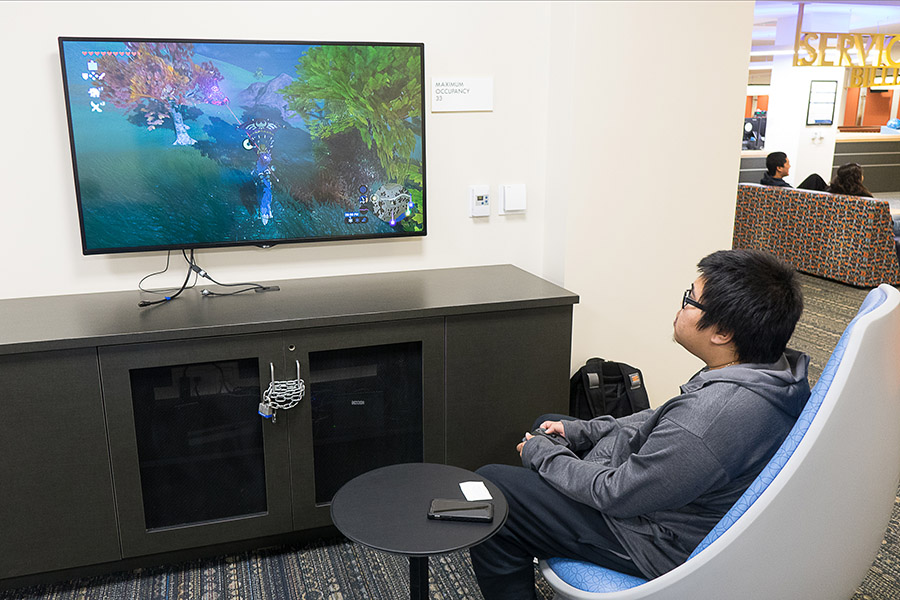
Professors in different departments work to explore games from new angles
By their nature, video games mean different things to different people. To some, they’re simply toys; to others, they’re objects of technical interest, a means of showing advancements in computer graphics or computing power. But the possibilities of video games are much broader. Here at UC Davis, professors in several disciplines are exploring the potential interests of this technological art form.
Colin Milburn is a professor of English and cinema and digital media as well as science and technology studies. His research into the relationship between literature, science and technology has often involved video games.
“I’ve been studying games and gaming culture for about 12 years now,” Milburn said. “Recently, I’ve been looking at the role of games and gaming culture in shaping political attitudes, particularly around the politics of technology and the politics of science […] everything from hacktivist groups like Anonymous or LulzSec who may use video game technologies or software as part of some of their protest operations, to the role that video game imagery and motifs and memes have played in shaping political communities and online discourse.”
Milburn became deeply interested in the possibilities of video games when he realized the extent to which certain games were addressing the issue of nanotechnology, another one of his research interests.
“I had been interested in games for most of my life, but I hadn’t actively pursued them as a research topic until that point,” Milburn said. “Then as I started looking into them I discovered that a tremendous number of commercial games were grappling with some of the social implications of nanotechnology. That was really my first research interest, and then I became convinced that games were a hugely important way of communicating technological and scientific issues [and] of engaging citizens in larger social questions and ethical debates.”
Milburn is also the director of the ModLab, an on-campus research group that focuses on the intersection of technoscience and society, and has studied and developed several video game projects.
“One of our major projects has been a Shakespeare-focused video game called ‘Play the Knave’ which uses motion-capture cameras, Kinect cameras, to map players’ body movements onto avatars and asks people to put on performances of Shakespeare plays,” Milburn said. “It’s a way of getting people to engage with Shakespearean language and the conventions of theatrical performance, while also coming to address their own relationship to the computational interface by their engagement with the form of theater.”
Patrick LeMieux, an assistant professor of cinema and digital media and a member of the ModLab, has been involved in game design for over 20 years, making games like Speculation, an alternate reality game about Wall Street banks.
“Overall, I’m interested in the way in which play reveals the material histories and community practices of different discourses — from conceptual art to finance capital,” LeMieux said.
LeMieux has collaborated with Stephanie Boluk, an assistant professor of English, on both research and teaching. LeMieux and Boluk recently published a book called “Metagaming: Videogames and the Practice of Play,” and they co-teach Cinema and Digital Media 172: Videogames and Culture, which is cross-listed for English, cinema and digital media and science and technology studies.
“Rather than treat video games and culture as two distinct categories that play off one another, in this course we examine how play has evolved alongside video games as a mass medium, cultural commodity and digital technology,” LeMieux said. “And even though it’s a large lecture with about 200 students, we also put these theories into practice by close playing video games like Braid and Portal, learning how to speedrun retro games on Twitch TV, recording audio reviews of audio games designed by and for players who are blind or have low vision and commenting e-sports competitions together.”
Jorge Peña, a communication professor, has a lab which approaches video games from a different perspective than the ModLab. The Virtual Interaction and Communication Technology Research (VICTR) Lab focuses on the more immediate effects of video games on players.
“The work that we do at the VICTR Lab is looking at how exposure to video games, virtual environments, avatars, et cetera, can change people’s attitudes and behaviors in the real world,” Peña said. “For example, I was interested in whether randomly assigning people to thin or obese avatars would change people’s amount of physical activity as they’re playing a virtual tennis game; for that, I used the Wii Tennis game, in which I was able to modify the appearance of the participants and their virtual opponents.”
As with LeMieux and the ModLab, much of Peña’s work also involves collaboration, with students who work in his lab and with students who help design some of the games he uses for experimentation.
“In the laboratory I have the opportunity to work with students who are interested in building games,” Peña said. “I connect that to my own research interests, and I connect to students that are maybe communications students, that want to learn how to run experiments and how to do their own studies, so they help us in the laboratory to run the experiments […] essentially it’s a collaboration between faculty and students.”
Written by: Gabriel Mulcaire — features@theaggie.org



